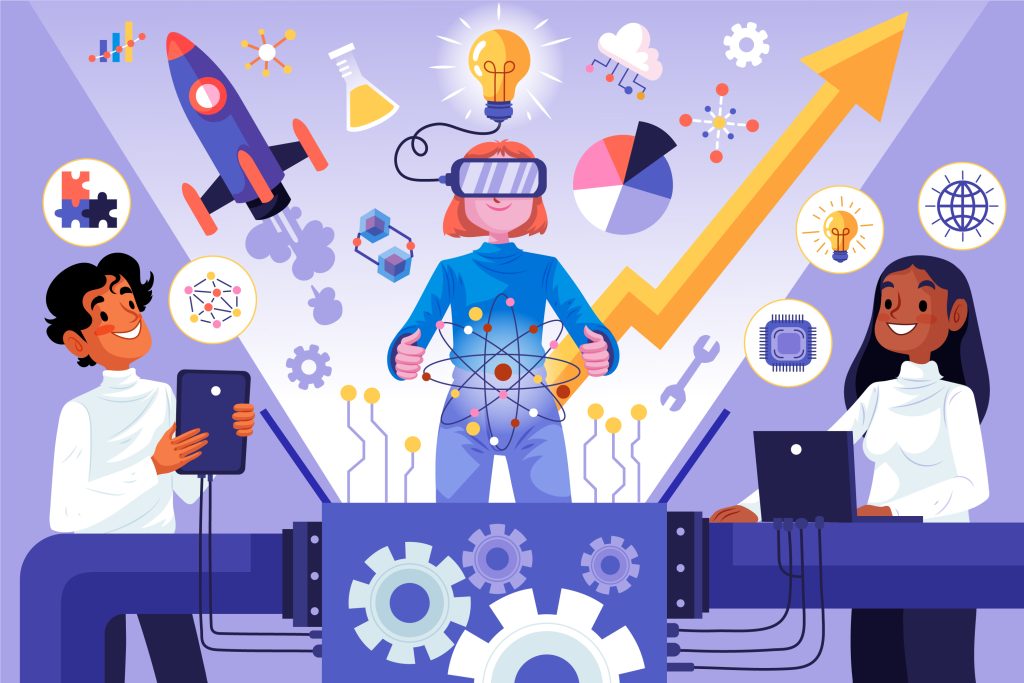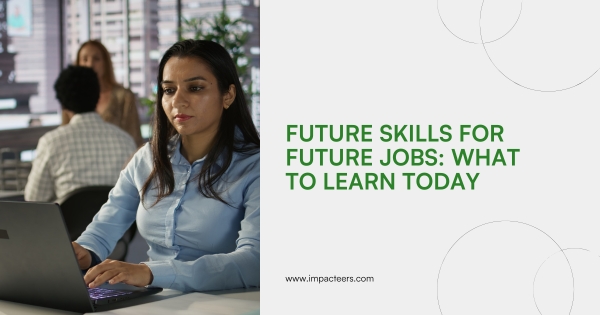Future jobs are changing at the breakcane pace operated by the needs of technology, automation and shifting industries. To remain competitive and relevant, people need to zero the skills that will shape tomorrow’s workforce.
Getting a handle on new trends, becoming technology-lover, and honoring important thinking, creativity and problem-solving abilities are important steps to gear up for future career.Students and professionals should invest equally frequent learning, adaptability and experience to flourish on hands. By identifying skills in demand today, you can secure a strong base for future jobs and ensure the success of long -term career.
The world of work is changing much faster than ever. A decade ago, a degree in engineering or management can guarantee a stability. Today, even the best marks do not give safe success. Employers are asking a different question: Can you learn, adapt and apply new skills quickly?
That’s why preparing for future jobs isn’t about guessing the next big thing. It’s about building the skills that survive change—both technical and human.
Visit Us >>>> https://www.impacteers.com/home
1) Why Future Jobs Look Different
Automation, AI, and digital tools are reshaping industries. Some roles disappear, but new ones appear. The constant factor? People who mix professional skills with technical expertise thrive.
Future jobs will reward:
- Fast learners.
- Problem solvers.
- Team players who communicate clearly.
2) Professional Skills: The Core That Lasts
Machines may handle data. But they can’t replace empathy, leadership, or trust. These professional skills will always matter:
- Communication that simplifies complex ideas.
- Adaptability when tools change.
- Collaboration across global teams.
- Leadership, even without titles.
Every fresher and professional must see these as career foundations.
3) Digital Tools Are the New Basics
Being digitally fluent is no longer optional. For future jobs, you need more than basic browsing. Employers expect comfort with:
- Cloud tools like Google Workspace or Office 365.
- Project management apps like Trello or Slack.
- Online research to filter credible information.
These basics make you ready for virtual and hybrid workplaces.
4) Engineering Thinking Beyond Engineers
Problem-solving is not just for coders or engineers. Every role—from HR to sales—demands structured thinking. That’s why “engineering mindset” is useful in all careers.
Learning basics of coding, analytics, or design thinking prepares you for unexpected job shifts.
5) Why Communication Is the Hidden Hero
You may pass every assessment test. But if you can’t explain your ideas in an interview, opportunities slip away.
How to practice:
- Share project updates weekly on LinkedIn.
- Join online training in public speaking.
- Summarize daily tasks to friends in simple words.
Clear communication multiplies the value of technical skills.
6) Online Education: Your Career Shortcut
Universities give foundations, but online education builds relevance. Future employers value self-learners.
Options to explore:
- Coursera, Udemy → technical certifications.
- LinkedIn Learning → professional skill micro-courses.
- EdX → management and leadership programs.
Online education shows recruiters that you take growth seriously.
7) Certifications That Carry Weight
Not all certifications matter equally. Choose those aligned with future jobs:
- Cloud and cybersecurity → high demand.
- Data and analytics → cross-industry need.
- Project management → leadership readiness.
Certifications are like tickets—they get you in the door, but real skills keep you there.
8) The Role of Skill Assessments
Employers now use skill assessment tests to filter candidates. These check both technical and professional skills.
Types of assessments:
- Coding challenges for developers.
- Case studies for management roles.
- Situational judgment tests for leadership.
Regular self-assessment helps freshers prepare, not panic.
9) Balancing Tech and Soft Skills
Think of careers like a seesaw. Too much focus on marks or tech leaves you lopsided. Balance comes from adding soft skills to the mix.
Here’s a quick comparison:
| Future-Ready Tech Skills | Professional Skills |
| Data analytics, coding | Communication |
| Cloud computing certifications | Adaptability |
| Cybersecurity training | Teamwork |
| UX/UI design basics | Leadership |
| AI/automation understanding | Problem-solving |
This balance makes you ready for future jobs across industries.
10) LinkedIn: A Career Mirror
For recruiters, LinkedIn is the first stop. Your activity there reflects your learning skills.
Best practices:
- Add certifications with dates.
- Post small reflections after completing training.
- Connect with peers in your field.
A strong LinkedIn profile tells employers you’re active, curious, and ready.
11) Stories That Prove the Shift
- Riya, management graduate: Average marks, but strong online education certifications. She landed a consulting role through a recruiter who spotted her LinkedIn post.
- Arun, engineering fresher: Practiced skill assessments online, shared projects, and now works at a top IT firm.
- Megha, communications student: Took UX and design training online. Her hybrid skills gave her an edge in digital marketing.
Marks didn’t define them. Skills did.
12) The Roadmap to Future Jobs
A simple 12-week plan to prepare:
Weeks 1–4:
- Take a skill assessment to find gaps.
- Update LinkedIn profile.
Weeks 5–8:
- Complete one online certification.
- Share progress posts weekly.
Weeks 9–12:
- Practice communication with small presentations.
- Attempt a mock assessment test online.
Repeat quarterly. Small steps make big results.

Conclusion: Today’s Effort, Tomorrow’s Success
Future jobs won’t wait for you to catch up. They demand professionals who mix adaptability with solid technical and professional skills.
Start small – an online certification, a linkeded post, a weekly skill test. These small habits are mixed in confidence and development of career.
The best time to prepare for future jobs? Yesterday. The next best time? Today.
About Us >>> https://blog.impacteers.com/
FAQs
1. What skills will matter most for future jobs?
Data literacy, digital fluency, problem-solving, and communication will lead across industries.
2. Do I need certifications to get a job?
Certifications help, but pairing them with real projects and visible proof on LinkedIn works best.
3. How do skill assessments prepare me?
They simulate real hiring processes, reduce anxiety, and highlight areas to improve.
4. Can online education replace college?
No. It complements it. College gives foundations; online training keeps you current.5. Which soft skill should I prioritize first?
Communication. It amplifies every other skill and shows up in every role.




Post Comment